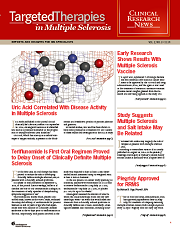Teriflunomide Is First Oral Regimen Proved to Delay Onset of Clinically Definite Multiple Sclerosis
For the first time, an oral therapy has been proved to reduce the risk of developing clinically definite multiple sclerosis in patients with a clinically isolated syndrome.

For the first time, an oral therapy has been proved to reduce the risk of developing clinically definite multiple sclerosis (MS) in patients with a clinically isolated syndrome. In a phase III trial published on September 2, 2014, in the journal Lancet Neurology, Miller et al clarified the role of oral teriflunomide (Aubagio) in the treatment of early episodes of demyelinating symptoms suggestive of MS.1
This randomized, double-blind, placebo-controlled study, known as the TOPIC study, evaluated the safety and efficacy of teriflunomide for patients between 18 and 55 years of age who had experienced their first instance of a clinically isolated syndrome in the 90 days prior to randomization in the trial. Importantly, each patient involved in the study was required to have at least 2 MRI-determined lesions (measured using T2-weighted MRI) at least 3 mm in diameter.1
In the 618-patient, 112-center study spanning 20 countries, patients were randomized in a 1:1:1 ratio to receive teriflunomide 14 mg daily (n = 216), teriflunomide 7 mg daily (n = 205), or placebo (n = 197) for up to 108 weeks.1
Investigators assessed the amount of time between the initial neurologic event and any new neurologic event—an event that would mark the transition from a clinically isolated syndrome to clinically definite MS (CDMS). Secondarily, investigators assessed MRI outcomes, including occurrence of new gadolinium-enhancing or T2 lesions.1
The study used an intent-to-treat design, but excluded from the study 2 patients who were randomized to receive teriflunomide but never received a dose of study medication.1
Both regimens of daily teriflunomide significantly reduced the risk of conversion to CDMS. The 7-mg dose reduced the risk of developing CDMS by 31.4% (P = .0020), and the 14-mg dose reduced the risk of developing CDMS by 34.9% (P = .0003).1
It is important for patients to understand the meaning of the 34.9% reduction in the risk of developing CDMS with use of teriflunomide. This percentage, which is derived from a hazard ratio, is a time-independent statistic. Subsequently, the result is difficult to imagine intuitively, and difficult for patients to understand.1,2
One way to imagine the reduction in risk of developing CDMS is in terms of a coin toss. Normally, if 2 identical patients have developed a clinically isolated demyelinating syndrome, the probability that one person would develop a CDMS before the other would be equal—like the odds of getting heads or tails when flipping a coin.2
In patients taking a 14-mg daily dose of teriflunomide, the first person to develop CDMS would be the person taking placebo in 61% of cases—not 50% of cases, as would be expected if both patients took placebo. In other words, teriflunomide reduces the risk of being the first person to develop MS among 2 identical individuals from 50% to 39%.1,2
Adverse events (AEs) occurring in the trial included increased liver enzyme levels, hair thinning, diarrhea, paresthesia, and upper respiratory tract infection. Each of these AEs occurred in at least 10% of patients using teriflunomide, and occurred at a rate at least 2 percentage points higher than in patients receiving placebo.1
Serious AEs included increased liver enzyme levels, which occurred in 2% of each treatment group—including the placebo group.1
The TOPIC study is the first to evaluate the efficacy of an oral treatment in reducing the risk of progression from a clinically isolated demyelinating syndrome to clinically definite MS.1
References
1. Miller AE, Wolinsky JS, Kappos L, et al. Oral teriflunomide for patients with a first clinical episode suggestive of multiple sclerosis (TOPIC): a randomised, double-blind, placebo-controlled, phase 3 trial. Lancet Neurol. 2014;13(10):977-986.
2. Spruance SL, Reid JE, Grace M, Samore M. Hazard ratio in clinical trials. Antimicrob Agents Chemother. 2004;48(8):2787-2792.
